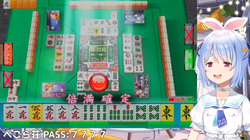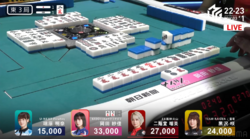Ippatsu: Difference between revisions
mNo edit summary |
m (→With haitei: timestamp) |
||
| (2 intermediate revisions by 2 users not shown) | |||
| Line 15: | Line 15: | ||
== Development == | == Development == | ||
In order for ippatsu to be counted, the hand must win before the hand in riichi discards its next tile. The earliest possible chance to win with ippatsu comes from the shimocha's discard (player to the right). The latest possible chance to win with ippatsu is with the player's next drawn tile after the riichi declaration. | In order for ippatsu to be counted, the hand must win before the hand in riichi discards its next tile. The earliest possible chance to win with ippatsu comes from the [[shimocha]]'s discard (player to the right). The latest possible chance to win with ippatsu is with the player's next drawn tile after the riichi declaration. | ||
Furthermore, no interruption to the turn must occur. This means that [[ | Furthermore, no interruption to the turn must occur. This means that [[tile calls]] will immediately end the chance for ippatsu. This includes any calls for [[kan]] ''except'' for a robbed kan ([[chankan]]). In [[sanma]], the call for [[kita]] also denies ippatsu. If the riichi player declares kan or kita, ippatsu is still denied. | ||
To repeat: even if a hand is won before the next discard, if a call is made, ippatsu is denied. Thus, players can purposefully make tile calls in order to disrupt another player's chance for ippatsu. | To repeat: even if a hand is won before the next discard, if a call is made, ippatsu is denied. Thus, players can purposefully make tile calls in order to disrupt another player's chance for ippatsu. | ||
| Line 25: | Line 25: | ||
* [http://tenhou.net/0/?log=2013061615gm-0089-0000-x380955c19e8f&tw=0&ts=3 Ippatsu] after [[kan]]. | * [http://tenhou.net/0/?log=2013061615gm-0089-0000-x380955c19e8f&tw=0&ts=3 Ippatsu] after [[kan]]. | ||
:Kan is called prior to the riichi call | :Kan is called prior to the riichi call, and the hand wins on the next draw without interruption, so ippatsu is scored. | ||
* [http://tenhou.net/0/?log=2014081719gm-0009-7447-73936980&tw=1 Ippatsu on discard] | * [http://tenhou.net/0/?log=2014081719gm-0009-7447-73936980&tw=1 Ippatsu on discard] | ||
| Line 34: | Line 34: | ||
* [http://tenhou.net/0/?log=2012110819gm-0009-7447-b68a0585&tw=2&ts=4 Ippatsu blocked] by [[Naki|tile calls]] | * [http://tenhou.net/0/?log=2012110819gm-0009-7447-b68a0585&tw=2&ts=4 Ippatsu blocked] by [[Naki|tile calls]] | ||
In this example, the hand wins from an opponent discard before the next tile draw. | In this example, the hand wins from an opponent discard before the next tile draw. However, two tile calls were made prior to the win, so ippatsu is not scored. | ||
== Compatibility == | == Compatibility == | ||
| Line 45: | Line 45: | ||
Note that [[chankan]] ''is'' compatible with ippatsu. When winning off chankan, the kan call is interrupted, so ippatsu is retained. | Note that [[chankan]] ''is'' compatible with ippatsu. When winning off chankan, the kan call is interrupted, so ippatsu is retained. | ||
===With haitei=== | === With haitei === | ||
[[Image: | [[Image:Ippatsu haitei.png|thumb|250px|right|Winning hand of ippatsu haitei in [[M.League]].<ref>[https://www.youtube.com/watch?v=A6AeROpoJI4&t=391 Ippatsu haitei] (M.League 22-23, Mar.03 #1, East 3 Round 1 honba, North seat)</ref>]] | ||
The last possible chance for riichi comes when there are eighteen tiles left in the walls, counting the fourteen tiles in the dead wall. That leaves four tiles left for regular player draws. After the last possible riichi, if no tiles are called, every player would have exactly one tile draw left. Therefore, the last tile would go to the riichi declarer, allowing both ippatsu and | The last possible chance for riichi comes when there are eighteen tiles left in the walls, counting the fourteen tiles in the dead wall. That leaves four tiles left for regular player draws. After the last possible riichi, if no tiles are called, every player would have exactly one tile draw left. Therefore, the last tile would go to the riichi declarer, allowing both ippatsu and haitei to be scored. Naturally, players may make tile calls to disrupt both yaku. | ||
== References == | |||
<references/> | |||
== External links == | == External links == | ||
Latest revision as of 22:36, 7 October 2024
| Type | Yaku |
|---|---|
| Kanji | 一発 |
| English | One shot |
| Value | 1 han |
| Speed | Riichi dependent |
| Difficulty | Luck |
Ippatsu 「一発」 is a yaku that is completely dependent on riichi. After declaring riichi, if the player wins before their next discard, and before anyone makes a tile call, ippatsu is scored. You must declare riichi to score ippatsu, so a hand can never have ippatsu by itself.
While ippatsu is generally considered to be a standard yaku, certain rulesets do not use it, in order to reduce variance and lower the value of a riichii. In general, when sitting down to play a game, ippatsu is counted unless otherwise specified or agreed on before the game.
Development
In order for ippatsu to be counted, the hand must win before the hand in riichi discards its next tile. The earliest possible chance to win with ippatsu comes from the shimocha's discard (player to the right). The latest possible chance to win with ippatsu is with the player's next drawn tile after the riichi declaration.
Furthermore, no interruption to the turn must occur. This means that tile calls will immediately end the chance for ippatsu. This includes any calls for kan except for a robbed kan (chankan). In sanma, the call for kita also denies ippatsu. If the riichi player declares kan or kita, ippatsu is still denied.
To repeat: even if a hand is won before the next discard, if a call is made, ippatsu is denied. Thus, players can purposefully make tile calls in order to disrupt another player's chance for ippatsu.
Examples

- Kan is called prior to the riichi call, and the hand wins on the next draw without interruption, so ippatsu is scored.
- This hand wins on a discard before the next draw.
Ippatsu nullified
In this example, the hand wins from an opponent discard before the next tile draw. However, two tile calls were made prior to the win, so ippatsu is not scored.
Compatibility
| RCH | DRI | IPP | SMO | TAN | PFU | IPK | ITT | YAK | SDJ | SDO | TOI | SNA | SNK | CHA | JUN | RPK | SSG | HRO | HON | CHN | CHI | RIN | HAI | HOU | CHK | |
| IPP |
Ippatsu requires riichi (or double riichi), so it is impossible for a hand to score with ippatsu alone. At the very minimum, a hand could be riichi with ippatsu. Riichi and ippatsu are scored as separate yaku.
Unlike riichi, ippatsu cannot be combined with two yaku: rinshan kaihou and houtei raoyui. Rinshan requires a kan call (after declaring riichi), which would invalidate ippatsu. As for houtei, a riichi declaration must be made with at least 4 tiles left in the live wall. That leaves the very last possible tile draw (and discard) belonging to the riichi declarer.
Note that chankan is compatible with ippatsu. When winning off chankan, the kan call is interrupted, so ippatsu is retained.
With haitei

The last possible chance for riichi comes when there are eighteen tiles left in the walls, counting the fourteen tiles in the dead wall. That leaves four tiles left for regular player draws. After the last possible riichi, if no tiles are called, every player would have exactly one tile draw left. Therefore, the last tile would go to the riichi declarer, allowing both ippatsu and haitei to be scored. Naturally, players may make tile calls to disrupt both yaku.
References
- ↑ Ippatsu haitei (M.League 22-23, Mar.03 #1, East 3 Round 1 honba, North seat)
External links
- Ippatsu in Japanese Wikipedia
| |||||||||||||||||||||||||||||||
